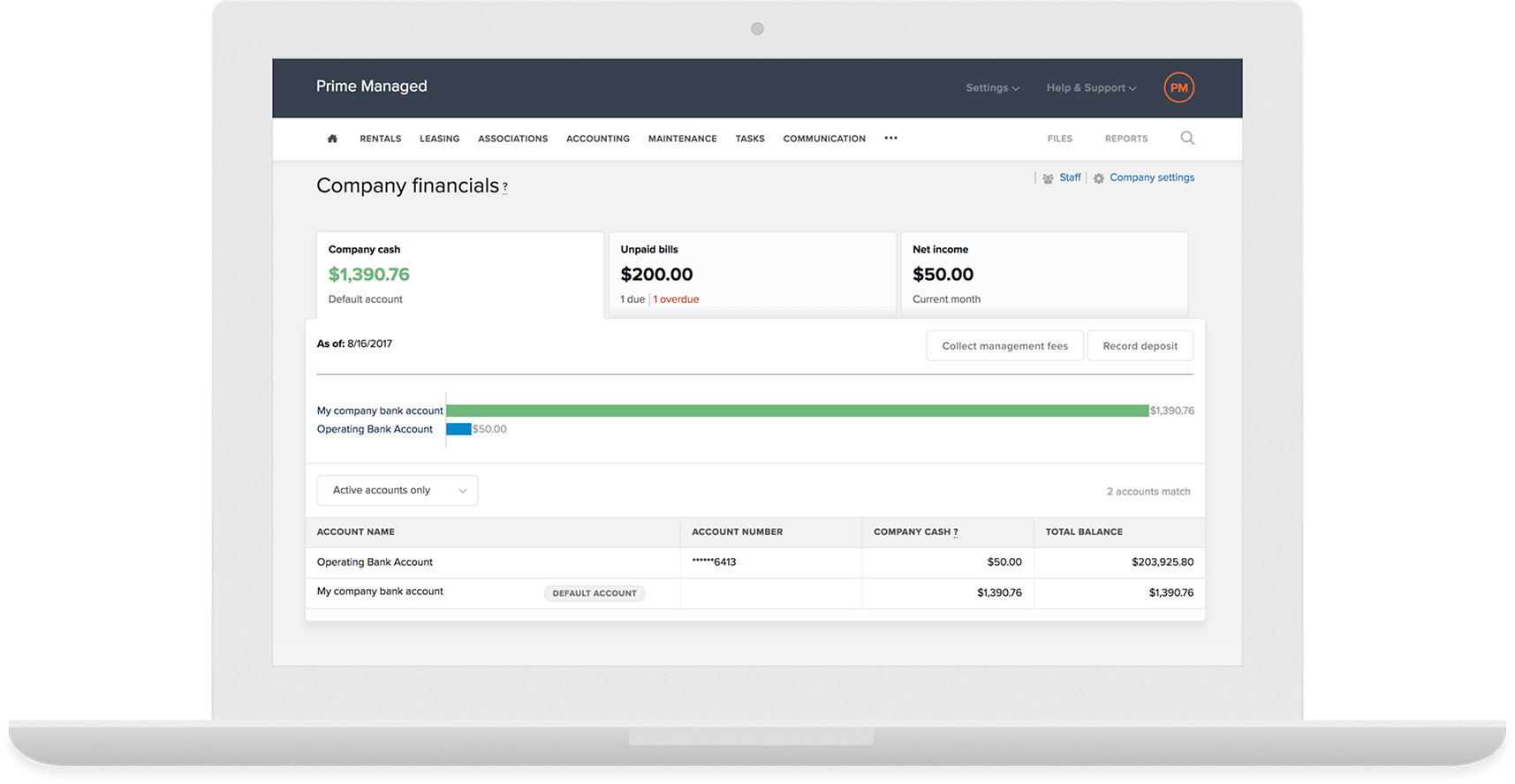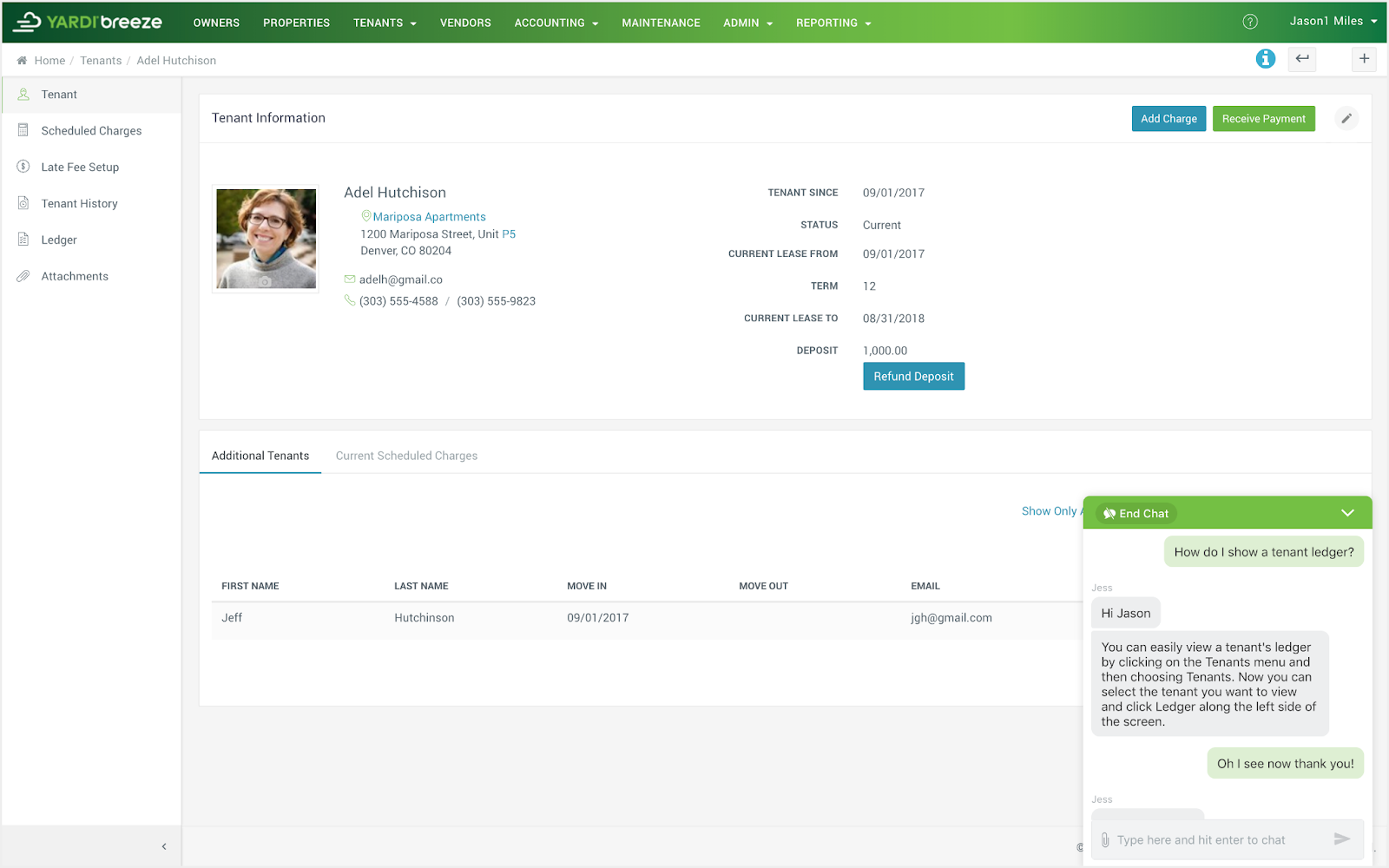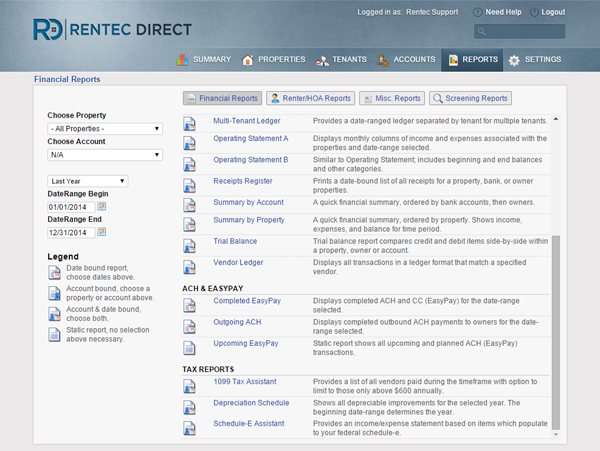Property Management Software Buyers Guide
This detailed guide will help you find and buy the right property management software for you and your business.
Last Updated on November 24, 2023What is property management software?
Property management software helps landlords and real estate professionals track leases, residents, and maintenance tasks, as well as collect rent and manage finances to reduce costs and streamline operations.
Here's what we'll cover:
What are the competitive advantages of using property management software?
What are the common business sizes using property management software?
What are some additional software that property managers may need?
What are the benefits of property management software?
Property management software applications can lead to several key benefits, including:
Tenant and lease tracking. Helps landlords keep track of tenant details, such as rent payments or contact information, and lease dates. Lease tracking can also automate the leasing process from prospect to move-out.
Maintenance management. Assists property managers in keeping buildings and utilities in operating condition so tenants find value and comfort in their homes. Residents can submit work orders, and a landlord can assign work and track schedules so that important property maintenance tasks are completed in a timely fashion.
Accounting. Allows users to track rent payments, use a general ledger, and generate reports to visualize the financial health of properties.
Tenant portal. Enables tenants to pay rent, make maintenance requests, and communicate with landlords at any time. This portal can also send alerts and notifications about upcoming rent dates or important messages from managers to residents.
What are the competitive advantages of using property management software?
Whether managing a single apartment complex or dozens of commercial facilities, property management software provides the functionality needed to handle daily tasks, letting a landlord focus on their business in other ways:
Grow your business. Automation, such as built-in tenant screening to find the best residents or renters, allows a property manager to spend more time marketing properties and managing applicants. Marketing tools give users the ability to post vacancies to various sites, such as Craigslist or Apartments.com, with just a few clicks.
Offer increased convenience. With an online tenant portal, residents can pay rent any time of day, which adds convenience for them and makes rent collection easier for landlords. In addition, the portal opens a line of communication amongst tenants and office and maintenance staff, so everyone can be quickly notified about important announcements.
Gain financial oversight. Reporting and analytics tools help landlords gather financial, tenant, or marketing data to identify trends that could be harming their business or opportunities to make improvements.
What are the common business sizes using property management software?
A property manager has different requirements based on their portfolio size and type. Software offers functionality to help any type:
Single and multi-family buyers. Perhaps the most common type of property management, these users enjoy a wide selection of systems that help manage apartments, condos or houses, including core functionalities of accounting and tenant tracking along with portals and vacancy marketing.
Niche-segment buyers. While most property management systems feature the same core functions, some focus on certain rental property segments:
HOA management software offers additional features to track the meeting minutes, bylaws, and elections necessary to operate an association.
Affordable housing software includes functionality to manage funding programs, track compliance, and generate audit reports.
Vacation rental property software focuses on online booking management and marketing features to give owners a wider reach for potential renters.
Enterprise level buyers. Those who manage several properties across a commercial enterprise can opt for a system that shows an overview of their entire portfolio.
What are some additional software that property managers may need?
Modern property management software helps handle virtually any day-to-day task, but depending on your specific needs, you may want to integrate your tool with other systems:
Marketing automation: A property manager with a large portfolio may need some extra help advertising rentals. Marketing software can help manage email, social media, or text campaigns to reach a wide swath of prospective tenants. Property managers can even work directly with real estate agents to help fill vacant rentals.
Maintenance management software: Residents deserve functional, clean properties, and property managers may need more robust work order systems to tackle the volume of daily maintenance requests.
Property management accounting software: Landlords can track rent payments, maintenance, and inventory costs, and create forecasts and budgets to gain an overview of financial health and maximize profits.
Rental property management software: Property owners can automate recurring tasks such as rent collection and generating financial reports, and handle maintenance requests remotely to manage a portfolio of properties.
Apartment management software: Includes core accounting and tenant and lease tracking functionality with additional online listing management tools, and a tenant portal to streamline rent collection.
Features guide
A list of common property management features
When comparing property management software, it's important to understand the functionality included in these tools. The most common functions of these systems are listed in the table below:
Accounting | Manage the general ledger, accounts payable, and rent payments. Most systems assist with bank reconciliation and generating financial reports. |
Tenant & lease tracking | Assists with the entire leasing process, including tenant screening for prospective tenants, move-in and move-out management, and rent and utility payment collections. |
Budgeting & forecasting | Develop accurate operating budgets and reports and forecast future costs and values, as well as account for consumer price index (CPI) changes, inflation, and market rates. |
Building maintenance | Submit and track work orders, either from employees or renters, and assign tasks to maintenance workers. |
Tenant portal | Allows tenants to pay rent and fees and submit maintenance requests, and opens a communication channel between residents and staff. |
Feature details and examples
Accounting: Accounting features in a property management solution work much like financial accounting in other systems: They help keep numbers accurate and up to date, with a general ledger, forecasts, and dashboards offering a holistic view of expenses and profits. Generated reports can be used to present to stakeholders and to identify trends or opportunities.

Accounting summary in Buildium
Tenant & lease tracking: This feature is the core of any property management system as it helps organize and track all important information about residents and lease agreements. This may include: past due payments, crucial lease dates, and contact information. Most systems also offer tenant screening tools as a part of tenant tracking.

A tenant profile in Yardi Breeze
Budgeting & forecasting: These features deliver value to a property manager by centralizing all current financial information and historical lease details to produce accurate projections and forecast future costs. Reporting features can be used to generate customizable reports to easily share information with stakeholders.

Various types of reporting options in Rentec Direct
Building maintenance:Maintenance management allows both residents and staff to submit, track, and assign work orders for any type of request, from structural issues to pest problems, through an online portal. Many systems can automatically assign tasks to maintenance workers to ensure a quick response.
![]()
SimplifyEm Software's maintenance tracking calendar
Tenant portal: An online portal offers residents various ways to communicate with landlords or office staff, accessible at any time of the day. Tenants can update contact information, pay rent and other fees, submit maintenance requests, view lease documents, and communicate with office staff.

A resident profile in the tenant portal from AppFolio
Property management software features you really need
Property management software is often flexible enough to match a property owner's specific needs and scale with their business growth. However, there are some crucial applications for certain types or stages of property management:
Small apartment complex or single-family homes | Tenant and lease tracking: For rental property managers with a smaller portfolio, rent payments and lease documents can be centralized for quick retrieval of important information, such as which resident's rent is past due. |
Multiple complexes, rentals, or an HOA | Tenant portal: When property owners have several buildings or rentals to maintain, letting tenants contact them through an online portal helps them stay on top of emerging problems they may have missed otherwise. |
Enterprise business | Corporate real estate professionals need more robust accounting and reporting tools to make strategic decisions in order to lower costs. Some may also consider facilities management software. |
Pricing guide
How property management software is priced and hosted
Typically, property management software pricing is based on a few key factors:
How many units do you manage?
How many applications do you need?
How do you want the system deployed?
Vendors most often charge per unit, per month—but be aware that many have minimum monthly costs no matter how large your portfolio. Other costs may include implementation, support fees, or hardware expenses.
In addition, costs may differ for on-premise or cloud-based deployments; cloud-based software is generally a smaller investment up front.
What are the hidden costs of property management software?
Property management software has a relatively simple pricing structure, but some solutions include costs that a landlord might not anticipate. In addition to the monthly fee per unit, consider these other common costs:
Add-on modules that may not be automatically included in the plan a landlord chooses
Implementation services or fees for the vendor to help set up the software for success
Training options to help a property owner's team use the system effectively
Access to an API to further customize the software to meet a landlord's needs
FAQs
What are the key functions of property management software?
As mentioned above, property management software offers several benefits:
Tenant and lease tracking: Manage tenant contact information, manage tenant screening, lease details, and important notifications to avoid late payments or move-out dates.
Maintenance management: Submit, assign, and track work requests from staff or residents, and close out work orders to ensure important tasks are completed in a timely manner.
Accounting: Track all your financial records, from rent payments to expenses, and generate reports to get an overview of operations.
Tenant portal: Open an online communication channel among landlords, staff, and residents, where users can make work requests or post to a message board. It often includes a rent manager where tenants can make a rent payment.
What questions should I ask vendors when evaluating property management products?
When seeking information about property management software, property owners should ask a few questions to make sure it's the right fit for their needs. These include:
What parts of the software do users most frequently report problems with?
While property owners should pay attention to what vendors are excited to share about their system, they should be sure to ask about common pain points for customers and which features typically take the most time to master.
What are the additional required costs for the software?
Aside from monthly subscription costs, a landlord should get an idea about additional costs for other services or hardware. Training and implementation are common, up-front costs to consider.
Can you customize the system to meet my specific needs?
Most vendors are flexible enough to customize their software by adding new fields for tenant information or combining a specific set of features for a landlord.
How can property management software help me with marketing?
Marketing your vacancies and conveying quality in the photos and text you post can be a time-consuming challenge for property managers. Modern property management systems offer functionality to help with website and vacancy management, with features for branding, search engine optimization, social media integration, and full marketing campaign management.
Check out this example of how software helps you market properties and find tenants in the busy summer months.
Can property management software help me find high-quality tenants?
A major feature of most modern property management solutions is tenant screening, which allows a landlord to screen for credit, eviction, and criminal records much faster than manual methods. Screen with accuracy to avoid bad tenants so you can spend more time showing off your amenities.
What are some drawbacks I should watch out for?
Property management software won't immediately solve your operational challenges, but it can significantly streamline your more tedious daily tasks.
As with any software investment, it's important to have a clear goal in mind for the system—maybe you need to automate rent collection or make it simpler for residents to make maintenance requests. A clear objective will help your company determine the exact functionality needed to reach it.
Tips & tools
Build a business case for property management software
Sometimes it's difficult to get management to sign off on a new investment like software. But there are a few key property management software benefits that could help you get buy-in from your team:
Faster lease signing. Automated vacancy postings and screening tools streamline the application process so that you find the best tenants and can have them sign leases quickly.
Automation facilitates communication. Software provides a tenant portal that connects residents and landlords to conveniently contact each other about important information so that managers can focus on improving the business.
Financial tools handle tedious tasks. Property management software has industry-specific tools to calculate common area maintenance (CAM) reconciliation or automate late fees.
Relevant articles
Here is some further reading about property management software that you should check out:
Boost Tenant Retention by Using Portals for Maintenance Requests
3 Ways Property Management Software Helps You Collect Rent on Time
Note: The information contained in this article has been obtained from sources believed to be reliable. The applications selected are examples to show a feature in context, and are not intended as endorsements or recommendations.